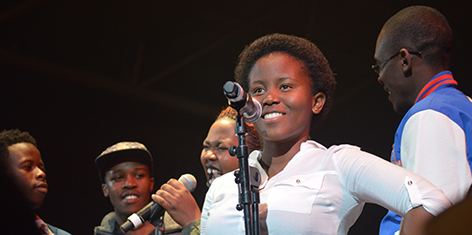Latest News Archive
Please select Category, Year, and then Month to display items
12 October 2020
|
Story Arina Engelbrecht
|
Photo Supplied
 Arina Engelbrecht from Organisational Development and Employee Well-being believes physical activity has a number of benefits for one’s health, including stress relief.
Arina Engelbrecht from Organisational Development and Employee Well-being believes physical activity has a number of benefits for one’s health, including stress relief.
Being physically active plays a big role in preventing the development of mental-health problems and in improving the quality of life of people experiencing mental-health problems.
Treatment for depression
Physical activity can be an alternative treatment for depression. It can be used as a stand-alone treatment or in combination with medication and/or psychological therapy. It promotes all kinds of changes in the brain, including neural growth, reduced inflammation, and new activity patterns are formed that promote feelings of calm and well-being. It releases endorphins – powerful chemicals in the brain that energise your spirit and make you feel good.
Physical activity can be very effective in relieving stress. Research in adults has found that physically active individuals tend to have lower stress levels compared to individuals who are less active. It also leads to improved sleep. When a person sleeps better and feels more rested, overall quality of life improves. They cope better with daily life stressors.
Reduce Alzheimer's risk
Regular physical activity can reduce your risk of developing Alzheimer's disease by up to 50%. It can also slow down further deterioration in those who have already started to develop cognitive problems. It stimulates the brain’s ability to maintain old connections as well as to make new ones.
A study asked people to rate their mood immediately after periods of physical activity (e.g. going for a walk/run, cycling, doing housework) and periods of inactivity (e.g. reading a book or watching television). Researchers found that participants felt more content, more awake, and calmer after being physically active compared to after periods of inactivity.
In conclusion, people who are physically active feel a sense of well-being, feel more energetic throughout the day, sleep better at night, have sharper memories, and feel more relaxed and positive about themselves and their lives.
“Being physically active not only changes your body, it changes your mind,
attitude, and your mood.” – Arina Engelbrecht
I-DENT-I-TIES tackles identity in an unusual story-telling style
2016-07-26
 One of the leading performers, Baanetse Mokhotla.
One of the leading performers, Baanetse Mokhotla.
Photo: Thabo Kessah
The I-DENT-I-TIES project has been an enormous experience for the Qwaqwa Campus students who were part of this large-scale interdisciplinary performance project. This is according to Baanetse Mokhotla, one of the leading performers.
“I have personally learnt a lot about performing arts and also grew as an individual,” Baanetse said about the production that was part of this year’s Vrystaat Arts Festival in Bloemfontein.
This massive interactive production of the 54-member student cast utilises music, song and dance in an unusual method of story-telling. It uses live video camera feeds on two big screens as well as recorded video clips of the cast itself and members of the community, some of whom were part of the audience during the two shows staged on the Qwaqwa Campus. The cast intermittently mingles with the audience, thus allowing the latter to be part of the narrative as well.
The main story line explores issues around identity while using the famous Basotho story of ‘Moshanyana Sankatana’ as a catalyst.
Two of the capturing features are the live interviews and the narration of the animated ‘Moshanyana Sankatana’ story, creating stories within a story.
Commenting about the project, SRC President Paseka Sikhosana said that he was happy to have led the student community during this proud moment.
“I loved how this show has exposed our enormously talented performers to the world. It was magical and we need more of such to ensure there will never be a dull moment on our campus,” he said.
Sociology lecturer Sivuyisiwe Magayana said: “I-DENT-I-TIES production was fresh fun. It exhibited the fact that we should be appreciative of other's differences. It also emphasised that we should move away from subscribing to an 'in-group' and 'out-group' mentality when it comes to issues of race, sexuality and identity.”
The international creative team behind this project included a New York-based Dutch director, Erwin Maas; Vienna-based Dutch theatre designer, Nico de Rooij; Djana Covic, a Serbian performance-craft-artist based in Vienna; and South African film and stage legend Jerry Mofokeng.